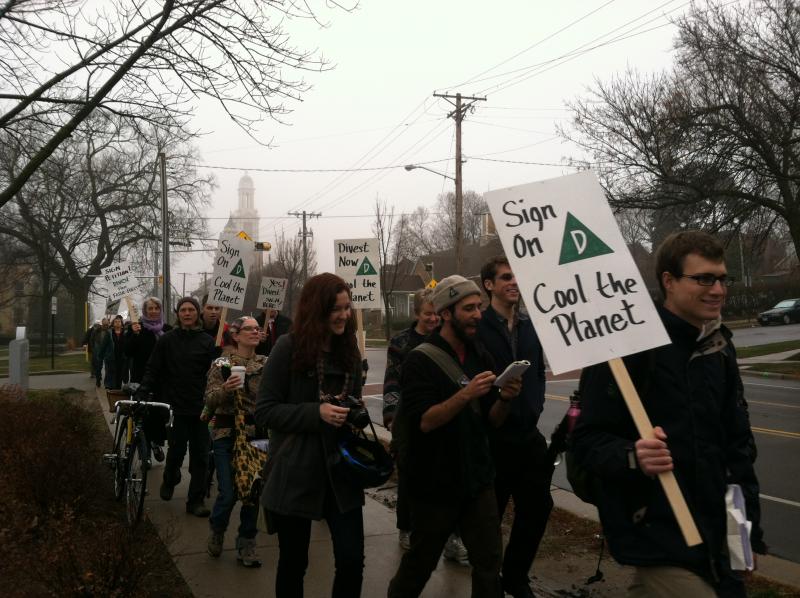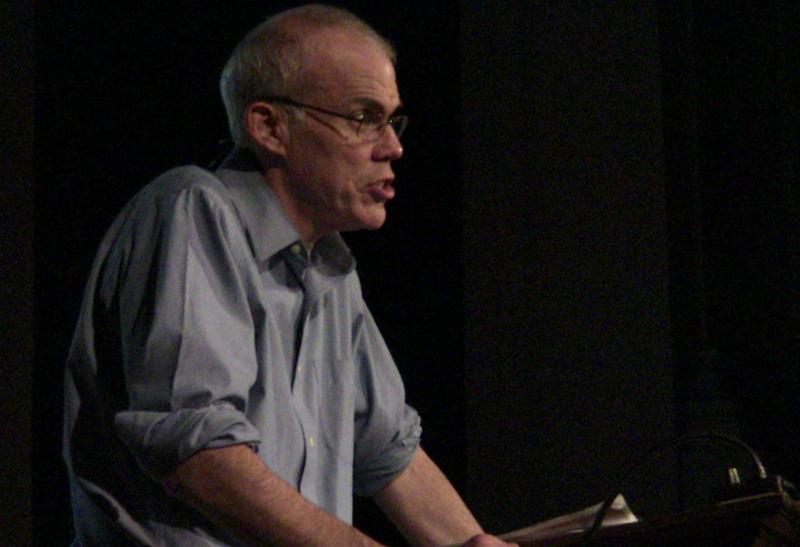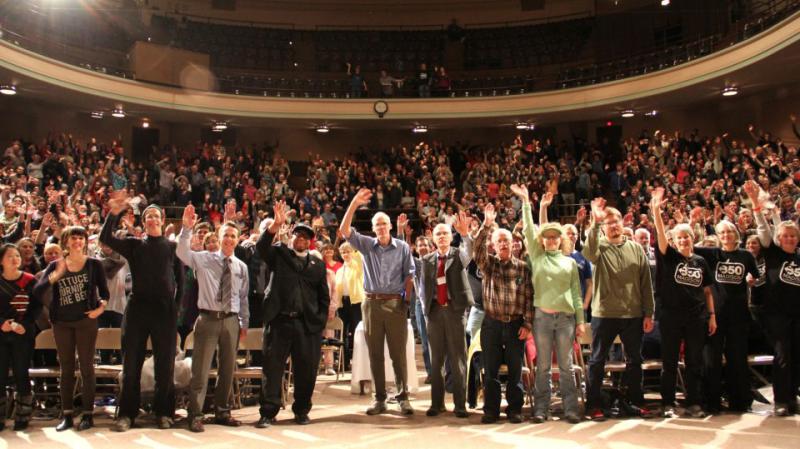Submitted by Sara Jerving on
 MADISON -- This morning, a group of students and alumni delivered over 1,000 signatures to University of Wisconsin Foundation President Mike Knetter demanding that the university divest its holdings from the fossil fuel industry. The activists point to science that shows the industry is slowly cooking the planet and divestment, or "hitting them where is hurts," as a moral imperative.
MADISON -- This morning, a group of students and alumni delivered over 1,000 signatures to University of Wisconsin Foundation President Mike Knetter demanding that the university divest its holdings from the fossil fuel industry. The activists point to science that shows the industry is slowly cooking the planet and divestment, or "hitting them where is hurts," as a moral imperative.
As the students gathered on a December day which will top 60 degrees, Elisa Collins Zinda carried her one year-old daughter strapped to her back and talked about why she was there. "I hope my daughter will be able to build a snowman some day," she said.
The effort was launched in conjunction with 350.org, a nonprofit advocacy organization spearheading a nationwide "divest now" campaign, targeting the fossil fuel industry in the same way that the South African apartheid government was successfully targeted by campaigners in the 1980s. The leader of the organization, Bill McKibben, brought his "Do the Math" tour to Madison last week to explain the divestment strategy to a sold out hall. The campaign is targeting 200 publicly traded companies, which hold the majority of the world's fossil fuel reserves. The University of Wisconsin Foundation's endowment fund has $2.5 billion in total assets. UW-Madison is one of 100 campuses across the U.S. where an active divestment campaign has been launched and the number is sure to grow.
The two-hour long teach-in Thursday night highlighted some of the most disturbing figures associated with the continued use of fossil fuels and laid out a roadmap for grassroots activists to demand divestment from colleges, universities and other community institutions.
The Troubling Math
The numbers McKibben laid out in his talk and in a recent Rolling Stone article don't look good. The earth's temperature has already raised .8 degrees Celsius, which has already been more problematic than scientists had projected. World governments agree that warming above 2 degrees Celsius would be disastrous for the planet and those living on it. If we stop increasing CO2 levels now, the temperature would still continue to rise, putting us at three-fourths this 2 degree mark. The Carbon Tracker Initiative, a team of London financial analysts and environmentalists, estimates that proven fossil fuel reserves of the industry and countries like Venezuela or Kuwait are already five times the amount that can be released to stay within that 2 degrees Celsius increase.
"That coal, gas and oil is below the ground physically, but it is above the ground economically," McKibben said. "That's what gets the share price for Exxon or Shell, when Peabody coal wants to borrow money, that's their collateral. It's going to get burned. There is no room for doubt, wishful thinking or speculation. Unless we alter the path in a fundamental way." McKibben argues that activists need to convince firms and governments that 80 percent of these reserves have to stay in the ground.
Debate Over, Exxon Mobil CEO Admits to Changing Climate
 It's hard to say there is still a debate about the climate changing when even the CEO of Exxon Mobil Rex Tillerson admits it's happening. Exxon is the largest publicly traded oil company in the world. The company alone has seven percent of the reserves that it would take for us to reach that 2 degree increase, said McKibben.
It's hard to say there is still a debate about the climate changing when even the CEO of Exxon Mobil Rex Tillerson admits it's happening. Exxon is the largest publicly traded oil company in the world. The company alone has seven percent of the reserves that it would take for us to reach that 2 degree increase, said McKibben.
"I'm not disputing that increasing CO2 emissions in the atmosphere is going to have an impact. It'll have a warming impact," Tillerson said. His comments came this past summer amidst the worst drought the U.S. had faced since 1956.
But Tillerson's solution to this problem, is a stunner. Tillerson calls the problem "an engineering problem" with "engineering solutions." The world simply needs to "move crop production areas around," he argued. When McKibben played this video clip, some in the audience gasped. The notion that American crop production (a.k.a., Wisconsin family farms) could be shifted to the tundra, did not go over well with this mid-western audience.
A study by scientists at Stanford University found that a 2 degree Celsius increase in temperature would cut grain yields by up to 20 percent. Over the record-breaking heat of the summer, corn prices on the Chicago Board of Trade, the global benchmark, increased nearly 45 percent. This would have little consequence on a fossil fuel company executive, said McKibben. But for the majority of people living around the world this can be devastating. More than one billion people in the world live on less than one dollar a day.
"If you make closer to a dollar a day, this is a very big deal. It's probably the biggest thing to happen to you this year," he said. "You are having to pay 40 percent more for the corn to make tortillas for dinner."
Fossil Fuel and Nuclear Weapons
 The divestment from fossil fuels is different than other corporate campaigns of the past, the speakers said. The campaigners are not asking the companies for a slight change in their business practices -- such as paying their workers higher wages. They are targeting the very core of the fossil fuel industry's business plan, threatening its position as the most profitable industry on earth. The stakes are also different -- this fight is for the survival of humanity, Rev. Yearwood, president of the nonprofit advocacy organization Hip Hop Caucus, said.
The divestment from fossil fuels is different than other corporate campaigns of the past, the speakers said. The campaigners are not asking the companies for a slight change in their business practices -- such as paying their workers higher wages. They are targeting the very core of the fossil fuel industry's business plan, threatening its position as the most profitable industry on earth. The stakes are also different -- this fight is for the survival of humanity, Rev. Yearwood, president of the nonprofit advocacy organization Hip Hop Caucus, said.
"The only possible analogy is the companies that manufacture nuclear weapons," said author Naomi Klein in a video message. "But at least those companies tell us that their weapons won't actually be used to destroy the planet -- they are just kind of there as a deterrent. Fossil fuel companies offer no such assurances. In fact, they are counting on their particular brand of weapons being used -- against your futures, against the climate, because burning carbon is the whole point of digging it up."
The only way to fight our fossil fuel addiction, she said, is to "get the pushers out of our faces." Then the U.S. can focus on changing its mindset of infinite economic growth and unlimited consumption.
For more information on the "Do the Math" tour, click here. For information on starting your own divestment campaign, click here.

Comments
Anonymous replied on Permalink
Credit?
Sara Jerving replied on Permalink
Photographs
Anonymous replied on Permalink
Says Who?
NC Greenie replied on Permalink
Don't divest?